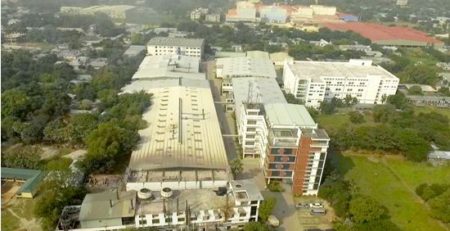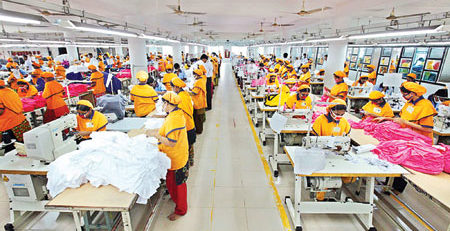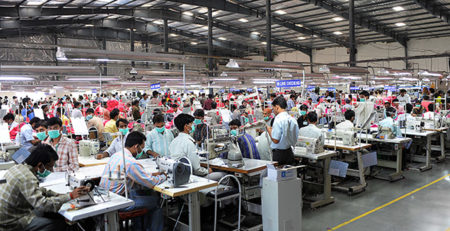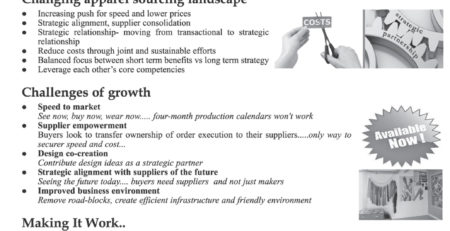Necessity of higher study in garment business management
Manufacturing industries are on the move westward from the Far-East. China has reached its pinnacle of growth. Apparel buyers of the world are forced to pursue the ‘China Plus One’ policy for sourcing. Bangladesh has already become the second largest exporter of apparels, but it is still behind China by a big margin. The textile industries of Bangladesh are adamant to reduce this gap.
With the help of the Government of Bangladesh (GoB) the textile industries are planning to increase their apparel export from $28 billion to $50 billion by 2021. However, it will not be an easy feat as the resources available to increase exports are not at the optimal level yet. Along with shortfall of other resources, human resource development will be serious hurdles to expansion of exports.
Since their inception, the Dhaka University (DU) and the Institute of Business Administration (IBA) have been producing quality graduates and postgraduates. Many of them are in leading roles in not only business but also in the non-government and government organisations. They have produced entrepreneurs and leaders for the apparel industry as well, but unfortunately they have failed to produce enough manager-level personnel for the largest exporting industry of the country. The most likely reason behind this might be that the graduates from the aforementioned institutions are in high demand in the multinational and national corporate world. The apparel industry simply does not appeal to them.
That is why the industry needs to produce a new generation of confident and efficient managers who will lead the country’s garment industry to the number one position in the world. These managers need to be produced through a customised and relatively short post-graduate diploma (PGD) programme.
What does the industry need? The industry needs urgently a large number of ‘go-getter’ type managers who can get things done now and drive the industry’s leadership in the right direction so that it can grow to meet the global needs and our first generation entrepreneurs can retire peacefully, leaving their ‘hand-grown child’ industry to reliable and dependable corporate managers.
To produce such a type of managers who can get things done, we need, through our training programme, to impart them the following five things:
- Personality (Talent)
- Aptitude
- Knowledge
- Knowhow (skill)
- Attitude
For the PGD programme, trainees will be enrolling themselves for it after their graduation. By then, they have a background of 15/16 years of schooling. Through these long years of schooling and social life they will be able to attain their personality and aptitude. A short academic training programme cannot do much in forming or reforming these qualities or characteristics of an individual. We will have to cater to these needs through a rigorous Inter Services Selection Board (ISSB)-style process to select candidates with right personality and aptitude. The challenge then will basically lie with the talent hunt. It’s like the Bangladesh Krira Shikkha Protishtan (BKSP) hunting talents in the schools to select their students. The BKSP cannot turn everyone into a Sakib Al-Hasan. One needs a minimum natural endowment of skills to be trained as a star performer. Fifty per cent of our problem can be solved, if we make the right selection.
The next 25 per cent of the problem will be to impart the relevant knowledge and know-how to them. This can be done through three modules of training of three-month duration each. Under the first module, they can be given the knowledge of basic management subjects by IBA teachers. Under the second module, they can be sent for industry attachment (Internship) to acquire hands-on knowledge about all activities carried out by the employees from machine operators to managers at all departments of a garment industry. They must know how to do it in order to get it done by the others. That is what the managers do to get things done. In the process, they will also be able to identify or assess their lacking in knowledge in the trades of the industry which they improve upon under the third module where industry trade-related subjects will be taught by practising national and foreign industry experts.
The remaining 25 per cent of the problem lies with instilling the right kind of attitude among the trainees. The whole range of pedagogy, environment and ambience, in which knowledge and skills would be imparted, will make them think in a more different way than their peers. They will be encouraged to write, make presentations, speak and participate in classroom discussions. They may be compelled to speak English during their time on the campus. They may be sent to the university playground compulsorily to undertake physical training (parades, games, sports, swimming etc.). Then only they will be experiencing discipline, be imbued with the spirit of team building and also get the physical fitness and the stamina to work hard. They can be trained on all sorts of discipline (playground, classroom, table etc.), dress, postures, gestures, manners and etiquettes by defence school adjutants. These trainers should evaluate the students’ performance on such learning and give marks for ‘Manager Like Qualities’ (MLQ) that should be counted in the final results.
In one session a week under the third module (12 to 15 sessions), they will meet prominent industry leaders. (Some foreign guests may be invited for these sessions with the students to socialise them with the guests and practise English speaking.) The leaders would share their experience and concerns by delivering encouraging, inspiring, motivating and morale-boosting talks for the students.
In the process industry leaders would feel the sense of involvement in developing managers for them; that may encourage them to employ students after their graduation. Finally, after receiving all these trainings, to be run by IBA-DU, the students will pass out walking tall with confidence and a ‘can-do’ attitude. They will not shy away from taking up any responsibility that may be bestowed upon them.
Dr. Zawad R Zahid is Professor at Institute of Business Administration, Dhaka University











Leave a Reply